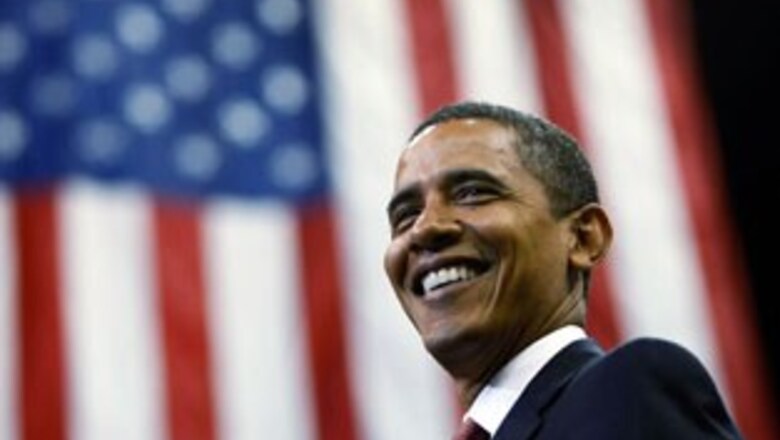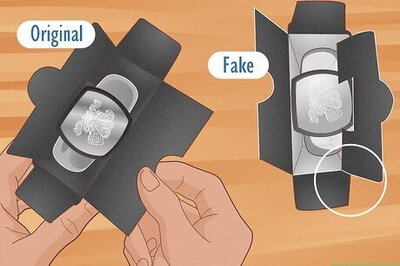
views
Chicago: Every year, the dedicated teacher would put together a bulletin board for Black History Month, honouring famous achievers.
There was Martin Luther King Jr., of course. Thurgood Marshall, the first black US Supreme Court justice. George Washington Carver, the inventor and scientist.
Several years ago, Loretta Augustine-Herron added a little-known face to the board at her Mississippi school. It was a photo of a friend she had worked closely with in Chicago who was just launching his political career.
His name was Barack Obama.
"Who is he?" the kids would ask.
"Just remember the name," she'd tell them. "Just remember the name. You need to know who this is because he's going to be President one day."
The mileposts are familiar by now:Humble childhood
The exotic childhood in Hawaii and Indonesia. The teen years struggling with his (Kenyan father, white mother) identity. The humble beginnings in Chicago. The success at high-powered Harvard. The legislative career in a sleepy state capital. The improbable leap from freshman US senator to presidential candidate.
Finally, on Tuesday, 47-year-old Barack Hussein Obama Jr. will be sworn in as America's 44th president, his hand resting upon the burgundy velvet, gilt-edged Bible used by Abraham Lincoln.
The odyssey that brought him to the White House has been extraordinary, in so many ways. Those who've witnessed his journey or helped to shape it remember the big and small moments; together, they recite the story of the unlikely politician who is about to become the most powerful man on Earth.
As a big brother, Barack Obama sometimes took on the role of father.
His half-sister, Maya, was just 16 when her father, Lolo Soetoro, died and Obama—nine years her senior—tried to fill the void.
They lived thousands of miles (kilometres) apart. But Maya would visit him in Chicago or New York, and he would introduce her to museums and art galleries, to jazz, classical and flamenco music, to different neighborhoods. And when it came time for her to check out college campuses, her older brother escorted her across around the country.
"He wanted me to see how big the world is," she says.
The big brother she'd tease—“Don’t touch the 'fro," he'd warn as a teen when she tried to mess with his hair—became a source of comfort and advice.
"He made sure I thought about things carefully, and considered them thoughtfully and let things sit in my mouth and brain for a while," says Maya Soetoro-Ng.
And in life's big moments, he proved to be a constant.
"I always had him there to offer guidance — where I should look for work and what I should look for in a life partner," she says. "He helped me to heal in disappointment and with the loss of our mother ... he helped remind me all that she had given us."
The two-hour phone interview was promising, so Gerald Kellman decided to follow up by meeting the job applicant—Barack Obama —while visiting New York. The men chatted at a coffee shop on Lexington Avenue. A start in public life
Kellman was looking to hire someone to help black residents of Chicago's poverty-wracked South Side develop their own political voice. Obama, a recent graduate of Columbia University, was inspired by the civil rights movement and interested in social change.
"He was extremely confident when I first met him," Kellman recalls. "He turned the interview around and ending up asking me as many questions as I asked him. He was very concerned about what we would be able to teach him. He wanted to learn how to change things."
When Obama became a community organiser for the Developing Communities Project, he'd talk strategy with Kellman.
"His way of operating was to think about things, not accept them as face value but to reflect," Kellman says. "His way of proceeding was very methodical. He never shied away from challenging people, but the way he did it was important. He avoided unnecessary confrontation."
PAGE_BREAK
In Chicago, politics can sometimes be defined by ethnicity and race, and Obama "wasn't very good at that," Kellman says. "Barack did that very poorly. ... People in conflict use whatever they can. They use race, anything they can to discredit you in Chicago, which is a tough place. ... Who he is at rock bottom is someone who brings people together."
If a political career was part of a grand plan, it wasn't apparent while Obama was working on the streets of Chicago.
"As organizers, we were trained to be suspicious of politicians," says David Kindler, who was based in Chicago's southern suburbs for the same group that employed Obama. "Folks we worked with tended to be ill-served by political relationships. You wouldn't go into a meeting to see how to get elected to office. They (community people) would have stoned you."
Kindler remembers one day when Obama, who was leading a training session for Midwest community organizers, offered a personal story. Obama told about being an inexperienced organiser and arranging for public housing residents to meet with officials to complain about their living conditions. He rented a van, waited in a church parking lot and as time passed, he became increasingly worried no one would show, Kindler recalls. Finally, a handful of people did and they attended the meeting.
"The heart of the story was him being terrified to take a group into action," Kindler says. "He didn't paint himself as a conquering hero. He told people about potential failure, his own fear that it was not easy to go out there and create change for the neighborhood. I always remember that. The organizers I knew were full of bravado: 'we can't be beat.'"
As apprehensive as he was, the young Obama already was proving to be a quick learner with keen instincts.
"He clearly thought strategically and understood how you can move from one place to another," Kindler says. "The politics of what we did was less about partisanship than it was the politics of power. ...
"The thing he was brilliant at was establishing a rapport with folks quickly. It was based on who they were, what their motivations were, what they wanted to accomplish."
And yet, Kindler says, back then he never could have anticipated what was ahead.
"If you said Barack Obama would be president some day," he says, "it would be, 'President of what?'"
Barack Obama had already made history as the first black president of the Harvard Law Review when he received a phone call from Chicago.
It was Douglas Baird, a professor in charge of the University of Chicago Law School's appointments committee. A colleague had tipped him off to Obama as an impressive prospect worth putting on his radar. So Baird moved fast, calling the third-year law student.
Are you interested in teaching law? he asked.
No, Obama replied, he planned to write a book about voting rights.
Baird extended an invitation: Come to the university, we'll give you a rent-free office and a word processor. You can write here.
"Here was a promising young scholar," Baird says, "and possession is nine-tenths of the law. The idea is a serious guy who is writing a book may well end up in law teaching. You'd much rather have him wake up deciding that when he's physically in your building."
Obama agreed, and about a month later, Baird says, he reported that his book had taken a different direction and it would be an autobiography—even though he was just in his early 30s.
Baird hoped Obama would become a permanent faculty member. Obama had other ideas: he wanted to run for state Senate.
PAGE_BREAK
"We spent a lot of time trying to persuade him to give up this political thing," Baird recalls. "We told him it was going to go nowhere."Lecturer and legislator
Obama eventually became a senior lecturer, focusing on constitutional law. But he wasn't a regular presence on campus because he was a legislator at the same time. Some around the law school regarded him as aloof, but Baird disagrees. "He's not someone who wears his emotions on his sleeve and he's never been that way," he says. "It's a characteristic, not a character flaw."
When Obama geared up to run for U.S. Senate, Baird again tried to discourage him. Think of the constant pressure to raise money, he warned.
"You'll spend two years of your life being a telemarketer, you're going to be calling total strangers," Baird recalls saying. "The best-case scenario is you'll wake up three weeks before the primary and there'll be a couple of people (opponents) in front of you."
In fact, Obama vaulted to victory in the crowded Democratic primary only after the multimillionaire front-runner imploded over personal problems.
Baird remembers talking with Abner Mikva, an Obama mentor, former judge and law school colleague the day after that primary win. "This is incredible, three weeks ago, he was running third," he told Mikva, who, according to Baird replied: "'Douglas, he has one attribute every successful politician has. He's lucky.'"
Maybe Michael Kang should have bid on the chance to spend a day with Barack Obama in Springfield.
Word around campus was Obama liked to drive fast and was a fun guy, says Kang, recalling the fundraising auction he passed up while attending the University of Chicago Law School.
Instead, Kang's recollections of the man who will be the 44th president stem from being a third-year student in Obama's "Constitutional Law: Equal Protection and Due Process" class.
"I remember him as a good, thoughtful teacher. Very fair," says Kang, who teaches at Emory University School of Law in Atlanta. "It was very difficult to tell what he thought about an issue. He was happy to play devil's advocate. He wanted to be really balanced. He made people comfortable saying what they thought on politically sensitive issues, such as race or abortion."
Obama was "friendly and approachable, but not necessarily super-outgoing and talkative," Kang says. And while some professors at Chicago taught with "a clear viewpoint," he adds, "you wouldn't necessarily know what his politics were."
Kang remembers one after-class conversation with Obama about contentious court decisions involving abortion and contraceptives. "He was comfortable seeing both sides," Kang says. "On one hand, he gave a lot of respect to women's rights. On the other hand, he understood the process questions and the role of the courts."
Kang says he figured Obama was heading somewhere but in law school, he was "just an ordinary guy ... who didn't take himself too seriously, wanted to be reasonable and hear out different perspectives."
With more than a dozen men on death row in Illinois wrongly convicted and accusations that Chicago police had beaten confessions out of suspects, some state lawmakers were determined to overhaul the criminal justice system. Barack Obama was one.
In 2002, Obama, then a state senator, sponsored a bill that would require police to make audio or videotapes of interrogations of murder suspects.
Peter Baroni was Republican legal counsel to the state Senate Judiciary Committee at the time, working with Obama as he tried to develop a way for police and prosecutors to find common ground with defense lawyers and civil libertarians.
"He was always very professional, very forthcoming," Baroni recalls. "He was not really a guy who would manipulate you or play games. ... He tried to take it (the debate) out of the political partisan bickering arena."
PAGE_BREAK
Over four or five months, Obama helped forge a consensus between defense lawyers wary of police tactics and law enforcement groups resistant to recording suspects' statements.
The bill eventually became law.
"He's a very good negotiator," Baroni says. "He's an incredibly at-ease guy. He never got excited about anything. Everything was low-key. Nothing ever got to the point where there was yelling and screaming. ... He was able to keep an open dialogue with both sides. He'd say 'What are your issues? 'What can we come up with for a resolution?' rather than pound the sand and walk away."
"Some politicians have a bloated sense of self-importance," he adds. "He never had that. He really didn't."
It was July 2004 and Barack Obama had been tapped to be the keynote speaker at the Democratic National Convention — an address he knew could be a make-or-break moment in his career.
But the Legislature still was in session because of a budget stalemate, so Obama was trapped in Springfield. And he had a speech to write.
He retreated to a distinctly unglamorous spot: an anteroom next to the men's room behind the Senate gallery where his colleague, state Sen. Kirk Dillard, noticed him working away.
"He'd be puffing on a cigarette, sitting there with his legal pad," recalls Dillard, who would get updates on the speech when he passed by.
On July 27, 2004, Dillard watched Obama's debut on television—a rousing 17-minute address.
"I thought his speech was phenomenal," Dillard recalls. "But it could have been spoken by a Republican or Democrat. He just had the personal story to go with it."
"I instantly knew it would be a hit with the media and the media would make him a national celebrity," he adds. "I was not surprised at all he became an instant player ... with his own skills and being the only African-American there.... But I never thought the presidency might happen as quickly as it did."
Dillard credits that July night, in part. "It's like one great moment in sports and your career is defined," he says. "That speech will continue to define him."
Terry Link and Barack Obama were elected to the state Senate the same day, became seat mates and fast friends. Link always joked Obama would move on before he did. He wasn't thinking at the time that it would be to the White House.
Link and Obama bonded over golf and Wednesday night poker games as part of a group dubbed "The Committee" that gathered over beer and cigars in Springfield to while away the nights when the Legislature was in session.
A few years ago when the buzz started about a possible Obama presidential campaign, Link was cool to the idea. "I said, 'Don't do it, don't do it.' I didn't know if he was quite ready."
But as he saw the growing crowds and enthusiasm, Link changed course. When he asked Obama to attend a campaign event in 2006, he took him aside, and walking arm in arm, urged him to seize the moment.
Last year, Link traveled the nation, campaigning for his former poker buddy.
A week after the election, Obama called Link and left a message.
"It was kind of funny. He said 'This is Barack Obama, your old card-playing friend' — like I'm not going to remember," Link says. Obama left his new cell phone number and an admonition NOT to share it with anyone.
Link returned the call, but missed Obama. When he left a message, he made sure to address him as 'Mr. President,' not Barack, as he normally did.
Link has two things he cherishes: a photo of Obama holding his newborn grandson two years ago at that 2006 campaign rally — and that number.
PAGE_BREAK
"I know if I ever called, he'd take my call," Link says. "I'm not looking for a job or any favors. I've got the cell phone number of the president in my pocket. That's all I want."
Loretta Augustine-Herron still remembers the October day in 1992 when she attended the wedding of Barack Obama and Michelle Robinson.
Several years had passed since she had first met Obama when he came to Chicago to work as a community organizer for the group she co-founded. On this momentous day, she approached the beaming groom as he mingled with guests. She had one request:
"When you become the first African-American president, I want to be at the inaugural ball,'" she says she told him. "He said, 'You've got it.'"
Then he laughed.
Sixteen years later, Augustine-Herron took two of her grandsons to Grant Park for Obama's victory celebration. Standing in the crowd that unusually warm November night, she remembered the young man who drank coffee and smoked cigarettes in her kitchen, worked 14-hour days and once boasted he could "burn" the floor with his dance moves — then proceeded to prove it.
She also remembered her long-ago prediction.
But when Obama takes the oath, Loretta Augustine-Herron will be watching it on television with her special education students at a South Side elementary school in Chicago.
"The children need to witness this, to talk about this," she says. "You know what? I always thought I wanted to be at the inauguration. But I really want to be with my students."



















Comments
0 comment